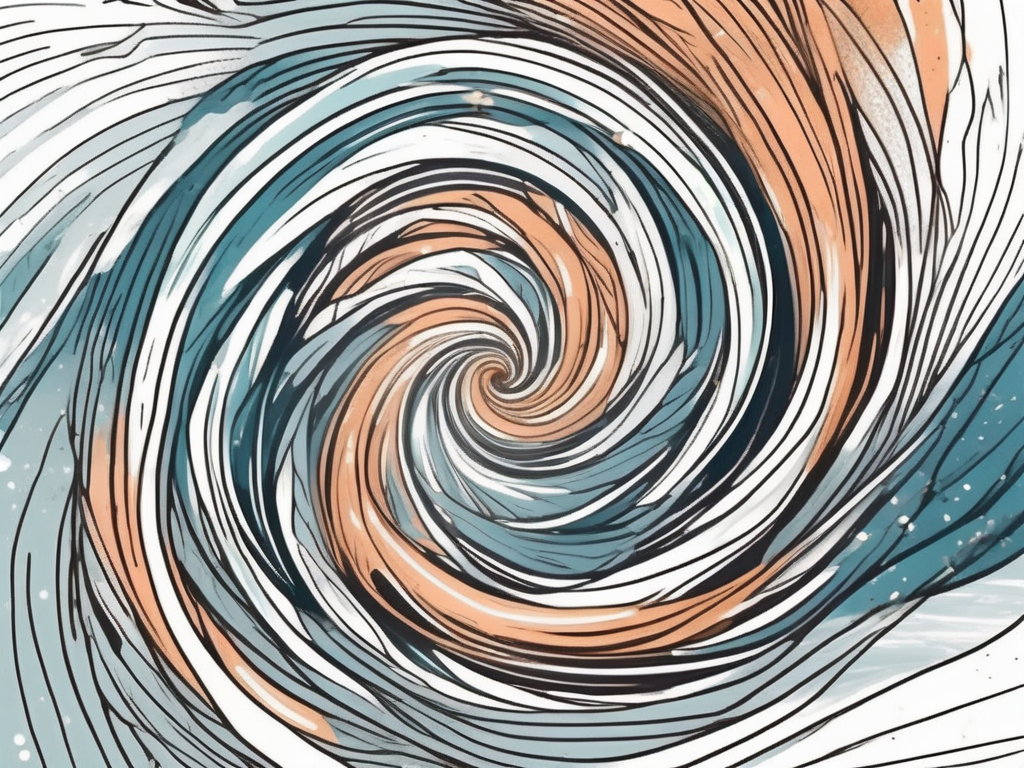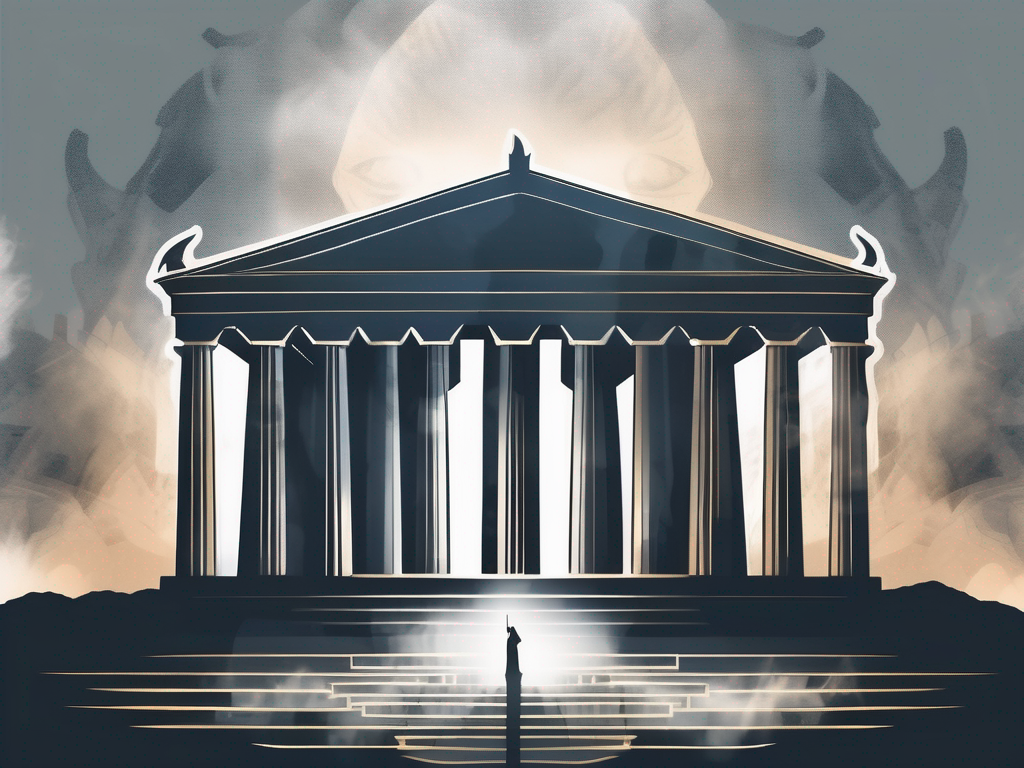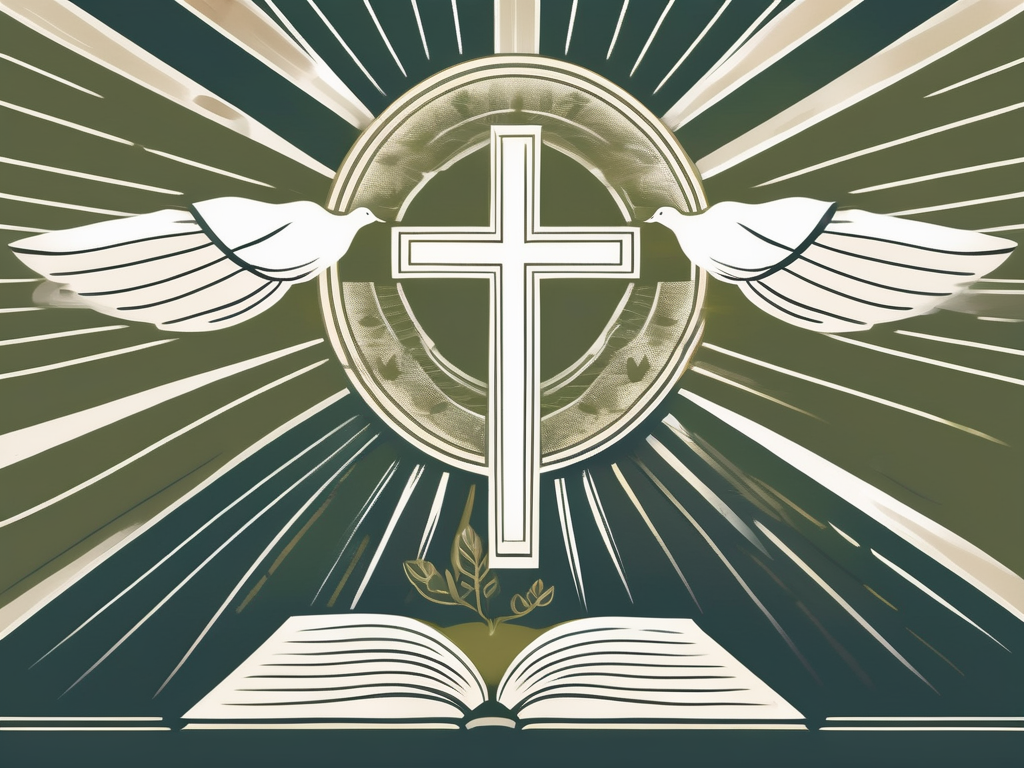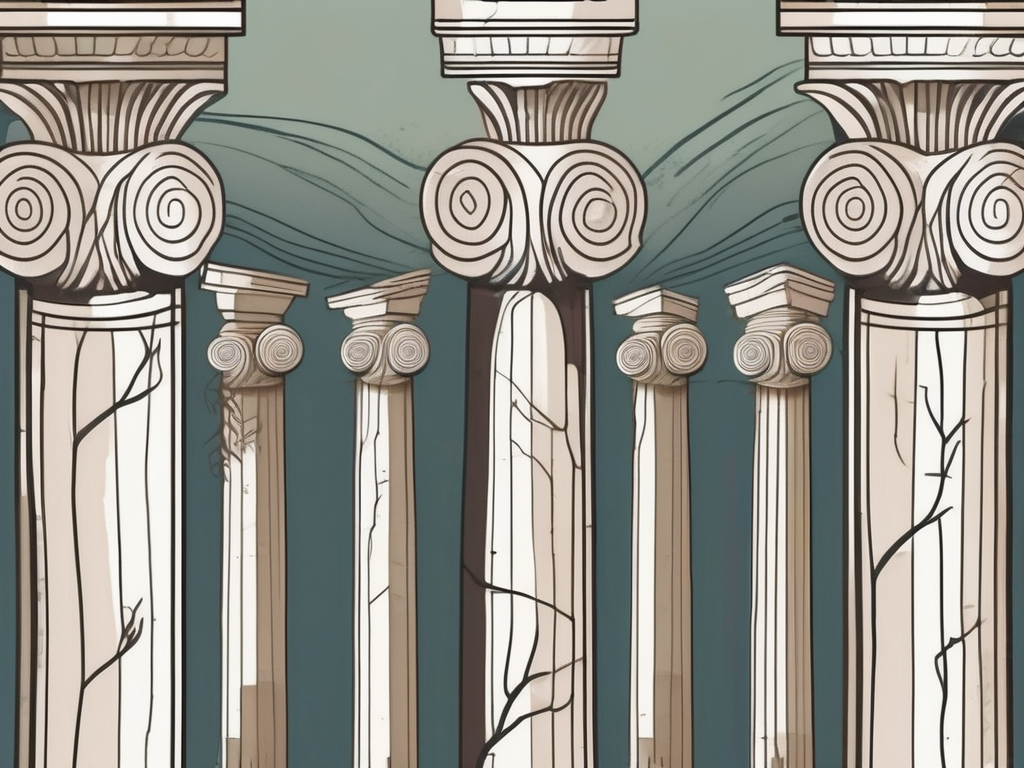In Greek mythology, Chaos is a fascinating deity, representing both disorder and the origin of everything. This powerful being played a crucial role in the ancient Greek beliefs and continues to inspire and intrigue us today. Let’s explore the concept of Chaos from its etymology to its presence in literature and modern culture.
Understanding the Concept of Chaos in Greek Mythology
Chaos, as a concept, is deeply ingrained in Greek mythology. In fact, the word “chaos” itself originated from the Greek term meaning “emptiness” or “gap.” It represents a void of primordial nothingness, existing before the creation of the universe and the gods themselves.
Ancient Greeks believed that Chaos was not just an absence of order but a force in its own right, marking the beginning of everything. It served as a backdrop against which cosmic events unfolded, shaping the world as we know it.
The Origin and Etymology of Chaos
The word “chaos” traces its roots back to the ancient Greek term “khaos,” indicating a vast emptiness. The concept of Chaos first appeared in Hesiod’s Theogony, a poem that detailed the genealogy of the gods. Here, Chaos stands as the very first deity, preceding even the powerful Titans and Olympian gods.
But what does it mean for Chaos to be the first deity? It signifies that Chaos is the ultimate origin, the primordial essence from which all things emerged. It is the void that existed before time, space, and even the gods themselves. This notion of Chaos as the foundation of creation is awe-inspiring, as it suggests that everything we know and see is rooted in this ancient emptiness.
Its powerful influence extended beyond Greek mythology, permeating other ancient belief systems, such as Egyptian and Persian cosmogonies. The notion of Chaos as a foundation of creation persists across various cultures, highlighting its universal appeal.
The Role of Chaos in Ancient Greek Beliefs
Within ancient Greek beliefs, Chaos played a dual role. On one hand, it represented disorder and confusion, the absence of structure and boundaries. It was a state of formlessness and unpredictability, where everything was in flux.
However, Chaos was not solely associated with negativity. It also served as the catalyst for creation and transformation, the primordial source from which everything emerged. From Chaos, the gods, the Earth, and all living beings were born. It was the raw potential that allowed for the existence of order and harmony.
Furthermore, Chaos personified the void between Heaven and Earth, acting as the bridge connecting the physical and metaphysical realms. It symbolized the potential inherent in uncertainty, offering opportunities for growth and change. In this sense, Chaos was not something to be feared but embraced, as it held the promise of new beginnings and infinite possibilities.
As we delve deeper into the concept of Chaos in Greek mythology, we begin to appreciate its profound significance. It is not merely a chaotic state of disorder but a fundamental force that shaped the very fabric of the universe. From its emptiness emerged the gods, the Earth, and all living beings, giving rise to the rich tapestry of Greek mythology and the world we inhabit today.
The Personification of Chaos in Greek Mythology
Chaos, though an abstract concept, took on visual manifestations in Greek mythology. It represented the formless void, existing before the emergence of divine beings. From Chaos sprang forth powerful entities that shaped the universe’s fabric.
But what exactly was Chaos? How did the ancient Greeks perceive this enigmatic force? Let us delve deeper into the fascinating world of Greek mythology to explore the multifaceted nature of Chaos.
Chaos as the Void of Nothingness
As an entity, Chaos embodied pure nothingness. It lacked defined characteristics, appearing as an amorphous emptiness devoid of order or structure. Imagine a vast expanse of darkness, an abyss that stretches infinitely in all directions. This concept of Chaos as emptiness is evident not only in Greek mythology but also in various other ancient belief systems.
Within this void, there was no light, no sound, and no discernible form. It was a primordial state of existence, a blank canvas upon which the gods and goddesses would later paint their vibrant stories.
Chaos as the Source of Everything
Paradoxically, Chaos also served as the source of creation itself. From this initial emptiness, other primordial beings emerged, each with their own unique qualities and powers. Gaia, the personification of Mother Earth, rose from Chaos, bringing life and fertility to the world. Tartarus, the deep abyss, became the realm of punishment for the wicked. Eros, the god of love, embodied the creative and passionate force that binds all beings together. And Erebus, the personification of darkness, added depth and mystery to the cosmos.
These entities, born from Chaos, would go on to play significant roles in Greek mythology. They shaped the world as we know it, establishing the foundations upon which the gods and mortals would build their stories and destinies.
As we explore the intricate tapestry of Greek mythology, it becomes clear that Chaos was not just an abstract concept but a powerful force that shaped the very essence of existence. From its formless void emerged a myriad of beings, each contributing to the rich and complex tapestry of the ancient Greek pantheon.
The Offspring of Chaos
Chaos, the primordial force that existed before the creation of the world, had a profound influence on subsequent generations of deities in Greek mythology. From the depths of Chaos emerged a diverse and powerful lineage of gods and goddesses, each representing a fundamental aspect of the natural and supernatural worlds.
The first-born children of Chaos were Gaia, Tartarus, Eros, and Erebus. These ancient beings played pivotal roles in shaping the cosmos and establishing the order of the universe.
Gaia, the Primal Goddess
Gaia, also known as Mother Earth, was one of the most revered and influential deities in Greek mythology. She personified the Earth itself, embodying its fertility, abundance, and nurturing qualities. Gaia was the mother of all life, giving birth to countless gods, titans, and mortals. Her vast and fertile body was the cradle of existence, providing sustenance and shelter to all living beings.
As the embodiment of the Earth, Gaia was revered as a wise and benevolent goddess. She was often depicted as a matronly figure, radiating warmth and compassion. Her presence was felt in every aspect of the natural world, from the towering mountains to the gentle rustle of leaves in the wind.
Tartarus, the Abyss of Punishment
Tartarus, on the other hand, represented the dark abyss that lay beneath the Earth’s surface. This deep and foreboding realm served as a place of punishment for divine and mortal transgressions. It was a place where the most wicked and malevolent beings were condemned to suffer for eternity.
Within the depths of Tartarus, unimaginable horrors awaited those who had defied the laws of the gods. It was a place of eternal torment, where the guilty were subjected to unending agony and despair. The mere mention of Tartarus struck fear into the hearts of mortals and immortals alike, serving as a powerful deterrent against disobedience.
Eros, the God of Love
Eros, the god of love, symbolized the generative power that arose from Chaos. He embodied the passionate and transformative nature of love, influencing not only romantic relationships but also creative endeavors. Eros was the driving force behind the creation of new life, inspiring artists, poets, and musicians to express their deepest emotions.
As the son of Chaos, Eros possessed a unique ability to ignite desire and passion in the hearts of gods and mortals alike. His arrows of love had the power to unite souls, transcending boundaries and fostering deep connections. Eros was celebrated as both a mischievous and benevolent deity, capable of bringing joy and harmony to the world.
Erebus, the Primeval Darkness
Erebus, the personification of primeval darkness, was a mysterious and enigmatic deity. He embodied the shadowy depths that enveloped and concealed the Earth, symbolizing the unknown and the unseen. Erebus existed in the realm between light and darkness, serving as a gateway to the hidden realms of the supernatural.
As the offspring of Chaos, Erebus held a significant role in the balance of the cosmos. His presence was felt in the quiet stillness of the night, when the world was cloaked in darkness. Erebus was both feared and respected, for his realm held secrets and mysteries that few dared to explore.
The Second Generation of Chaos’ Progeny
Aside from these immediate offspring, Chaos was also an ancestor to some of the most powerful figures in Greek mythology. Its grandchildren include the Titans, a race of formidable gods who ruled before the Olympians. Among the Titans were mighty beings such as Cronus, Rhea, and Oceanus, who played pivotal roles in the shaping of the world.
From the Titans emerged a new generation of gods, including Zeus, Poseidon, and Hades, who would go on to become the rulers of the cosmos. These Olympian gods were revered and worshipped by mortals, their power and influence extending far beyond the realms of myth.
In addition to the Titans and the Olympians, Chaos’ lineage also included a myriad of other mythical beings that shaped the Greek pantheon. From the fearsome giants to the cunning nymphs, each creature and deity played a unique role in the intricate tapestry of Greek mythology.
Thus, the offspring of Chaos left an indelible mark on the world, their stories woven into the fabric of ancient Greek culture. Their existence and influence continue to captivate the imagination of those who seek to understand the origins of the universe and the complexities of the human experience.
Chaos in Ancient Greek Literature
Hesiod’s poetic work, Theogony, provides a comprehensive account of Chaos and its significance in Greek mythology. This influential poem establishes Chaos as the progenitor of the universe and the gods themselves.
Chaos in Hesiod’s Theogony
In Theogony, Hesiod describes Chaos as the very first deity, preceding even the Titans and Olympian gods. This divine entity embodies the fundamental state of nonbeing that preceded the existence of the cosmos.
Hesiod’s portrayal of Chaos emphasizes both its transformative potential and its unpredictable nature. It underscores how the primal forces embodied by Chaos shape the world and impact the lives of mortals and immortals alike.
References to Chaos in Other Ancient Texts
References to Chaos can also be found in various other ancient texts, including those of Homer and later Greek philosophers. These references often allude to Chaos as both the origin and ultimate destiny of all things, a concept that fascinated thinkers throughout antiquity.
The Influence of Chaos in Modern Culture
In addition to its influence in ancient Greek culture and literature, Chaos continues to captivate minds and inspire creativity in modern times. It has made its way into literature, philosophy, and various forms of popular media and entertainment.
Chaos in Literature and Philosophy
Many contemporary authors and philosophers have explored the concept of Chaos and its philosophical implications. From Friedrich Nietzsche’s writings on the eternal recurrence to the existentialist philosophy of Jean-Paul Sartre, Chaos remains a subject of contemplation and inquiry.
Chaos in Popular Media and Entertainment
In popular media and entertainment, Chaos often appears as a central theme in movies, books, and video games. Whether it’s the chaotic worlds envisioned by fantasy and science fiction writers or the representation of Chaos in role-playing games, its presence is felt as a source of excitement and adventure.
From the depths of ancient Greek mythology to the realms of modern imagination, Chaos has left an indelible mark on our collective consciousness. It reminds us that even in the absence of order, great possibilities unfold. Chaos is not merely a god of disorder and primordial creation—it is a timeless concept that continues to shape our understanding of the universe and our place within it.












